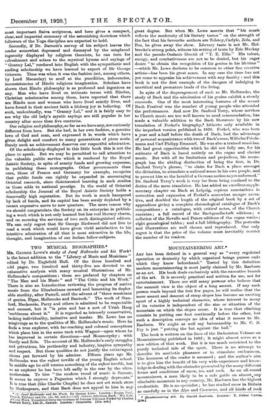TWO MUSICAL BIOGRAPHIES.*
MB. GEORGE Lowx's study of Josef Holbrooke and his Workl is the latest addition to the " Library of Music and Musicians " edited by Dr. Eaglefield Hull. Of the three hundred and odd pages, two hundred and thirty-five are devoted to an exhaustive analysis with many musical illustrations of Mr. Holbrooke's compositions ; these are prefaced by chapters on " The Man and his Music " and " The Critic and his Work." There Is also an Introduction reviewing the progress of native music from the Elizabethans onward and lamenting its deplor- able sterility, after Purcell, until the advent of "three musicians of genius, Eiger, Holbrooke and Bantook." The work of Stan- fond, Mackenzie, Parry and others is admitted to be respectable and earnest, but it "is prim and has a sort of Uriah Heap 'umbleness about it." It is regarded as intensely conservative, lacking individuality, imitative and insular. Mr. Lowe has no misgivings as to the qualities of Mr. Holbrooke's music. Here he finds a true explorer, with far-reaching and colossal conceptions which place him in the same rank with Wagner—upon whom he has improved in certain directions—and Moussorgsky ; with Hardy and Zola. The account of Mr. Holbrooke's early struggles and privations, his pertinacity and industry, inspires sympathy and respect. But three qualities do not justify the extravagant claims put forward by his admirer. Fifteen years ago Mr. Holbrooke was the enfant terrible of the young English school. In middle age he still retains something of the enfant terrible, but as an explorer he has been left Badly in the rear by the ultra- modernists. To him " the modern trend of music is Satanic. It seems to express a Paganism which I strongly deprecate." It is true that (like Charlie Chaplin) he does not set much store by Shakespeare,
and that Bach does not appeal to him in any
• (1) Josef Habrooke and his Work. By George LOUT. London : Kegan Paul. Tench, Trdbner and Co. (as. ad. net.1—(2) Johann Sebastian Back • His Life, Art and Work. Translated Rom the German of Johann Nikolaus Portal by Charles Sanford Terry. LIM.D.. Cantab. London : Constable, MA eat)
great degree. But when Mr. Lowe asserts that "his music reflects the modernity of his literary tastes" on the strength of the fact that his favourite authors are Tolstoy, Carlyle, Zola, and Poe, he gives away the show. Literary taste is not Mr. Hol- brooke's strong point, witness his setting of texts by Eric Mackay and the pseudo-Ossianio libretti of " T. E. Ellis." His talent, energy, and combativeness are not to be denied, but his eager desire "to obtain the recognition of his genius in his lifetime" —which Mr. Lowe declares to be common to other fine creative artists—has been his great snare. In any case the time has not yet come to appraise his achievement with any finality : and this book is not the first 'example of the dangers of indulging in uncritical and premature lauds of the living.
In spite of the disparagement of Buell as Mr. Holbrooke, the study of Barth and the admiration of his genius exhibit a steady crescendo. One of the most interesting features of the recent Bach Festival was the number of young people who attended the performances. And now Dr. Sanford Terry, whose services to Church music are too well known to need commendation, has made a valuable addition to the Barth literature by his now translation of Forkel's biography,* hitherto only available in the imperfect version published in 1820. Forkel, who was born a year and a-half before the death of Bach, had the advantage of personal acquaintance with two of Baoh's sons, Wilhelm Friede- mann and Carl Philipp Emanuel. Ho was also a trained musician. He had great opportunities which lie did not fully use, for his estimate of Bach is based entirely on the organ and clavier music. But with all its limitations and prejudices, his mono- graph has the abiding distinction of being the first, in Dr. Sanford Terry's phrase, "to claim for Bach a place amongst the divinities, to stimulate a national sense in his own people, and to present him as the homld of a German nation as yet unformed." Dr. Sanford Terry's work is very far from being confined to the duties of the mere translator. He has added an excellent supple- mentary chapter on Bach at Leipzig, copious annotations in correction and expansion of Forkel's somewhat meagre narra- tive, and doubled the length of the original book by a set of appendices giving a complete chronological catalogue of Bach's compositions ; a catalogue, with critical notes, of the Church cantatas ; a full record of the Bachgesellschaft editions ; a collation of the Novello and Peters editions of the organ works ; eight genealogical tables ; and a full bibliography. The portraits and illustrations are well chosen and reproduced. Our only regret is that the price of the volume must inevitably restrict the number of its readers.






































 Previous page
Previous page